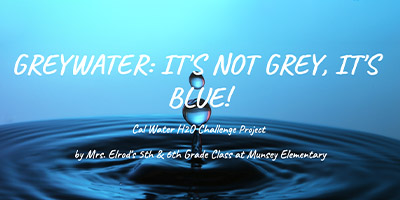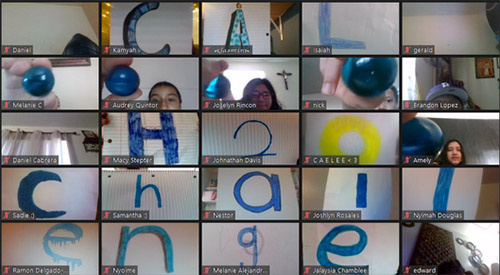
Munsey Elementary Students Win 2021 H2O Challenge
Students Proved Greywater can be Used to Solve Water Conservation Problems for Winning
 Barbara Elrod's fifth- and sixth-grade class from Munsey Elementary in Bakersfield, Calif., learned today that their project titled “Greywater: It's Not Grey, It's Blue” took home the grand prize in the 2021 Cal Water H2O Challenge. The grand prize includes a $3,500 classroom grant and a $1,000 scholarship for each participating student.
Barbara Elrod's fifth- and sixth-grade class from Munsey Elementary in Bakersfield, Calif., learned today that their project titled “Greywater: It's Not Grey, It's Blue” took home the grand prize in the 2021 Cal Water H2O Challenge. The grand prize includes a $3,500 classroom grant and a $1,000 scholarship for each participating student.
The Cal Water H2O Challenge (challenge.calwater.com) is a collaboration between Cal Water, the California Association of Science Educators (CASE), and DoGoodery. The free, project-based competition invites fourth-, fifth-, and sixth-grade classrooms in Cal Water service areas to develop and implement solutions for local water issues. During the pandemic, Cal Water evolved its model to help bring students a project-based learning opportunity, bearing in mind the limitations of distance learning. For the first time, students were able to focus on designing a water solution, in order to make the challenge more equitable and accessible amid coronavirus restrictions.
Kern County, an agricultural community that is the largest producer of almonds in the world, is in a drought, and local experts say water usage inefficiency is a problem, according to the class submission. Since water issues are a common topic of conversation in their community, the students wanted to help address this issue and develop a solution. For their project, students demonstrated that greywater can be used to support water conservation and shared their findings with their community.
The students began their research on greywater by speaking with a representative from the Kern County Water Agency. They then branched out and wrote to a wastewater officer, an almond farmer, and a soil chemist, among others. Additionally, they conducted various experiments including testing soil types and different properties of soap and water. They used these findings to create a web site that they shared with the school district. Their research earned them a front-page feature in the local newspaper and an interview with San Joaquin Valley Water News.
According to Elrod, the challenge immensely impacted both the students and their community. "My students felt empowered by the experts' interest in their results and project. For a while, it seemed everyone in their lives and the whole school community was talking about their project," Elrod said.
Since this year's competition was focused on design, the students plan to continue their pursuit of using greywater to increase water conservation in their community. Elrod described the lasting impact of the challenge, saying, "The overall effect of the water challenge is that my students made changes in their decisions about water usage. They now have a desire to educate others about water and encourage others to develop good water conservation habits. They have learned to work collaboratively, and become activists for environmental policies and change. In addition, the project proved that greywater can be a useful resource to help solve our local water problems."
Elrod believes that her class rose to the occasion and benefited greatly from the challenge. "I believe one success was to give my students projects that were meaningful to them personally and connect with the larger community that they would not otherwise have known about or been a part of. It gave them a reason to be invested in math, science, writing, and research," Elrod said. "Also, students' talents and interests emerged, and they were exposed to different careers. Now, some students are hoping to be architects or engineers, scientists, social activists, chemists, teachers, web designers, and so on. And, they all have a desire to win money to go to college. A big success was seeing a growing awareness that what they were doing was important. They achieved their goals and found real answers to local water problems."
Despite the unprecedented challenges this year presented, by integrating water conservation, educational programs, and school curriculum, DoGoodery, CASE, and Cal Water's partnership transcended distance learning and provided a space to connect with students and bring STEM (Science Technology, Engineering, and Math) and NGSS (Next-Generation Science Standards) into the virtual classroom.
“Ms. Elrods' fifth- and sixth-grade students went above and beyond to help support water conservation through their research on greywater, and I'm pleased to congratulate them on winning this year's Cal Water H2O Challenge amid some tough competition," said Martin A. Kropelnicki, Cal Water President and Chief Executive Officer. "I strongly believe that the next generation's ability to forge new solutions to water issues, even in times of hardship, will help guide us toward a better future for the communities we serve."

About CASE
The California Association of Science Educators (CASE) is a non-profit 501(c)(3) member-based community that works to lead the promotion of high-quality, equitable science education through advocacy, collaboration, and communication. Recognizing that science has a profound influence on our lives, our local environments, and our world. CASE fosters a community focused on enhancing scientific and environmental literacy and agency for all. For more information, visit cascience.org.
About DoGoodery
DoGoodery is a social impact agency with storytelling at the heart of its mission. DoGoodery collaborates with partners through all phases of social impact strategy building and storytelling, delivering goodness to audiences and clients alike and amplifying stories of change that empower, elevate, and excite. For more information visit www.dothegoodery.com.






